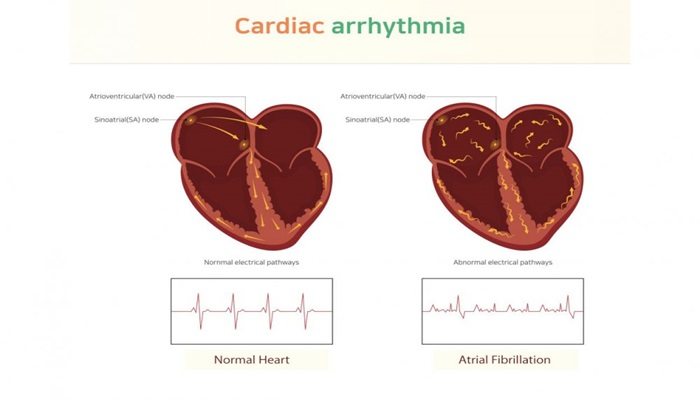Cardiac arrhythmias are abnormalities in the heart’s rhythm that can lead to significant health issues. They occur when the electrical impulses that coordinate heartbeats malfunction, resulting in a heart that beats too quickly, too slowly, or irregularly. Understanding the origins of these arrhythmias is crucial for effective diagnosis and treatment. This article explores the various causes of cardiac arrhythmias, including congenital factors, acquired conditions, and lifestyle influences.
Mechanisms of Cardiac Arrhythmias
Cardiac arrhythmias can be categorized based on their underlying mechanisms. The two primary mechanisms are abnormal impulse formation and conduction disturbances.
Abnormal Impulse Formation
Abnormal impulse formation occurs when the heart’s pacemaker cells generate electrical signals inappropriately. This can be due to:
Enhanced Automaticity: This is when certain cells in the heart begin to fire spontaneously, leading to tachycardia (an abnormally fast heart rate). For example, conditions such as hyperthyroidism can increase metabolic demands on the heart, causing it to beat faster than normal.
Triggered Activity: This occurs when abnormal depolarizations happen after the normal action potential. Early afterdepolarizations (EADs) can occur due to prolonged action potential duration, often seen in conditions like long QT syndrome.
Reentry Circuits: These circuits form when electrical impulses travel in a continuous loop within the heart tissue. This mechanism is commonly seen in atrial fibrillation and ventricular tachycardia.
Conduction Disturbances
Conduction disturbances occur when the pathways that carry electrical impulses through the heart are blocked or delayed.
Key factors include:
Heart Block: This condition occurs when electrical signals are delayed or blocked at the atrioventricular (AV) node. It can lead to bradycardia (abnormally slow heart rate) or complete heart block.
Structural Changes: Conditions such as cardiomyopathy can alter the structure of the heart, affecting how electrical signals propagate. For instance, scarring from a previous heart attack can create areas of non-conducting tissue that disrupt normal rhythm.
Causes of Cardiac Arrhythmias
The causes of cardiac arrhythmias can be broadly classified into congenital and acquired factors.
Congenital Factors
Congenital arrhythmias are present at birth and may stem from genetic mutations or structural abnormalities in the heart:
Congenital Heart Defects: These defects can affect the heart’s electrical system. For example, an abnormal muscle fiber connecting different chambers of the heart may lead to conditions like paroxysmal supraventricular tachycardia (PSVT).
Inherited Disorders: Certain inherited conditions, such as Long QT syndrome or Brugada syndrome, predispose individuals to arrhythmias due to genetic mutations affecting ion channels responsible for cardiac action potentials.
Acquired Factors
Acquired arrhythmias develop over time due to various medical conditions or lifestyle choices:
Coronary Artery Disease: Blockages in coronary arteries can lead to ischemia (reduced blood flow), resulting in scar tissue formation that disrupts normal electrical conduction.
Heart Failure: The structural changes associated with heart failure often lead to arrhythmias due to increased pressure and volume overload on the heart.
Electrolyte Imbalances: Abnormal levels of electrolytes such as potassium, sodium, calcium, and magnesium can significantly impact cardiac function. For instance, hyperkalemia (high potassium levels) can cause dangerous rhythms like ventricular fibrillation.
Thyroid Disorders: Both hyperthyroidism and hypothyroidism can alter heart rate and rhythm through metabolic effects on cardiac tissues.
Lifestyle Factors: Excessive alcohol consumption, smoking, stress, and stimulant use (such as caffeine or illegal drugs) can trigger or exacerbate arrhythmias.
Other Contributing Factors
Certain medical conditions can also act as triggers for arrhythmias:
Sleep Apnea: This condition leads to intermittent hypoxia during sleep, which can cause bradyarrhythmias or atrial fibrillation episodes.
Infections and Inflammation: Viral infections affecting cardiac tissues (like myocarditis) can disrupt normal conduction pathways and lead to arrhythmias.
Risk Factors for Developing Arrhythmias
Several risk factors increase an individual’s likelihood of developing cardiac arrhythmias:
Age: The prevalence of arrhythmias increases with age, particularly atrial fibrillation after age 50.
Family History: A family history of arrhythmias may suggest a genetic predisposition.
Other Medical Conditions:
- Hypertension
- Diabetes
- Chronic lung disease
- Kidney disease
Medications: Certain medications, especially stimulants and some antihistamines, may provoke arrhythmic events.
Substance Use: Drugs such as cocaine and methamphetamines are known to induce serious arrhythmias due to their stimulatory effects on the cardiovascular system.
Conclusion
Understanding the origins of cardiac arrhythmias is essential for effective management and treatment. These abnormalities arise from complex interactions between genetic predispositions, structural changes in the heart, electrolyte imbalances, and lifestyle factors. By identifying these causes and risk factors, healthcare providers can better assess patients at risk for arrhythmias and implement appropriate interventions.
As research continues into the electrophysiological mechanisms underlying these conditions, advancements in treatment options will likely improve outcomes for individuals suffering from cardiac arrhythmias. Early detection and management remain key components in reducing morbidity associated with these potentially life-threatening conditions.
Related topics:


